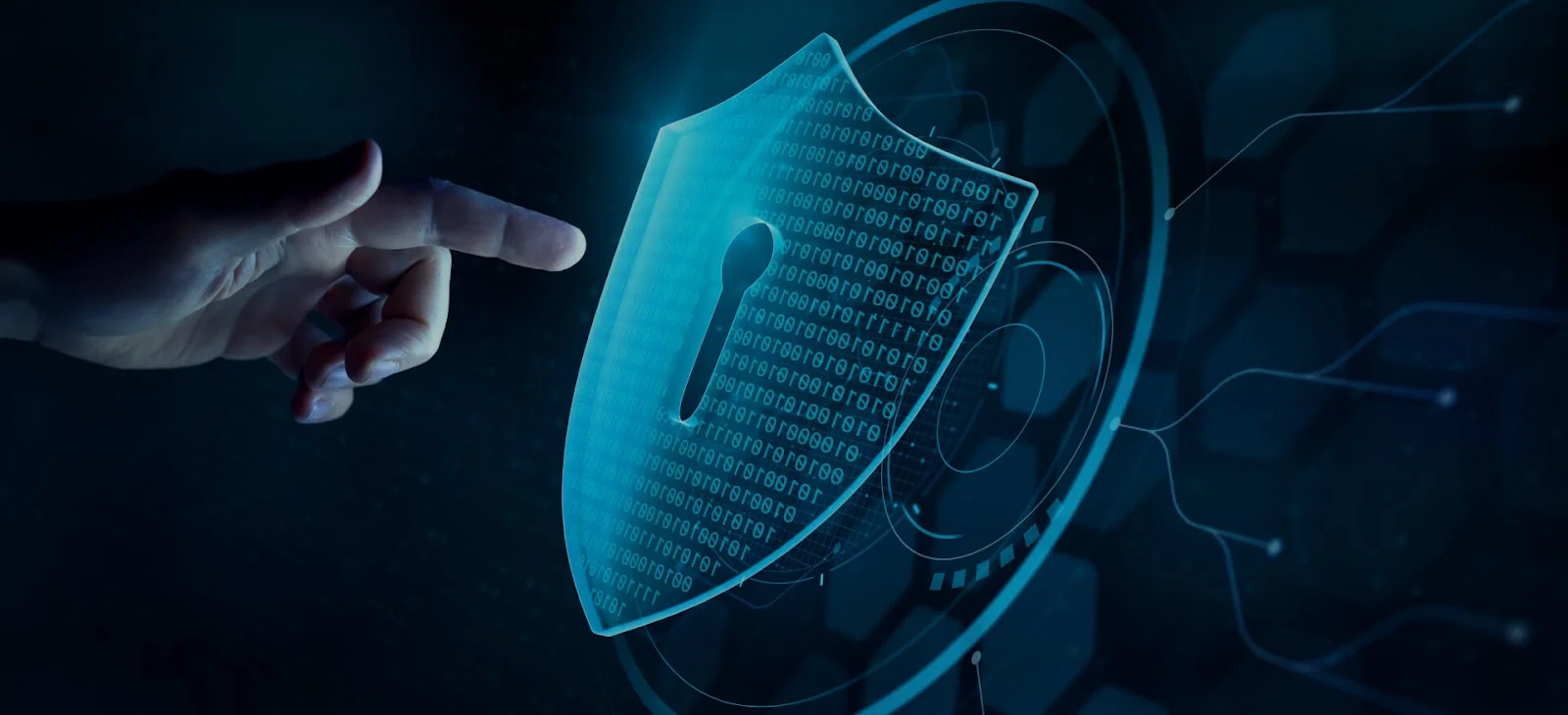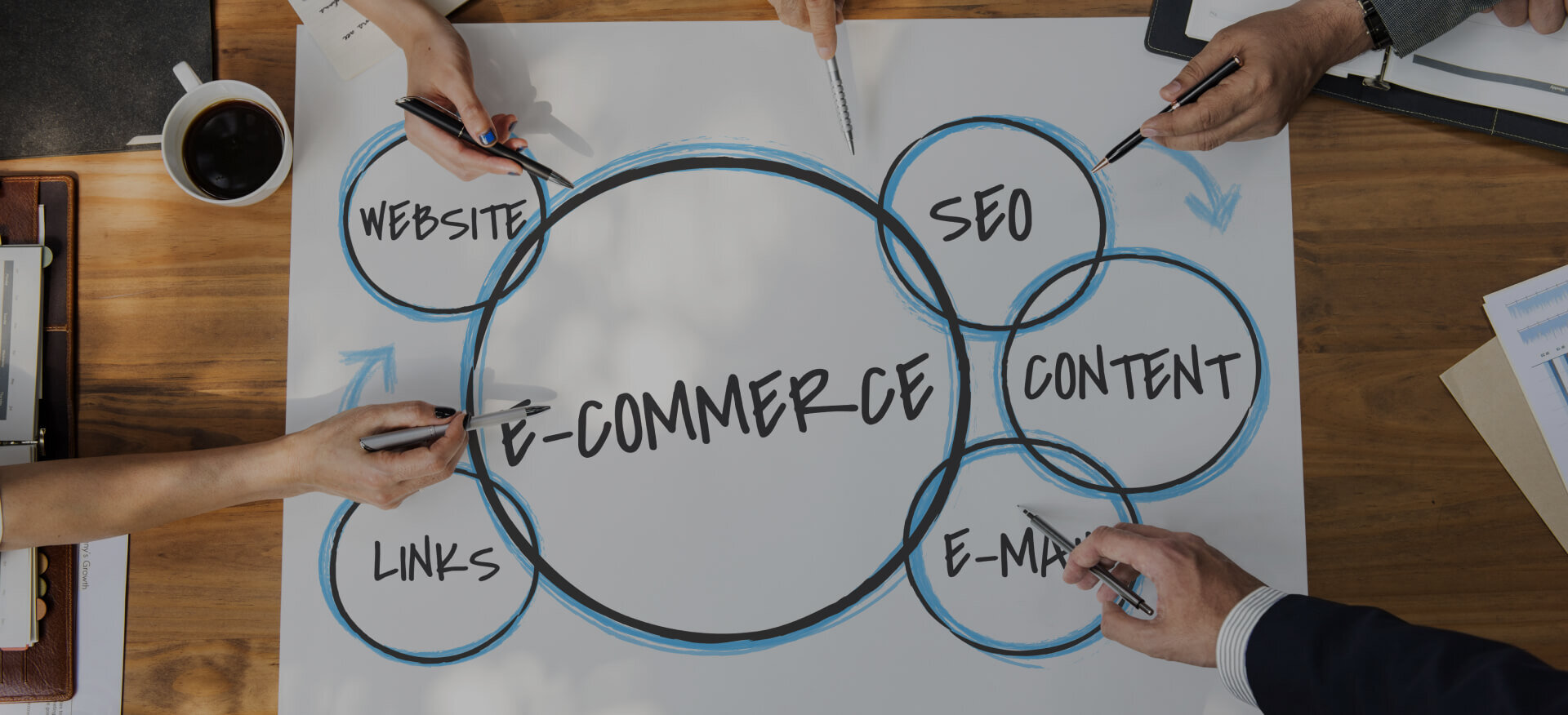Data has become one of the most valuable assets for any business today.
With cyber threats constantly evolving and regulations tightening, keeping sensitive information secure is a must, not a choice.
ISO/IEC 27001 is the go-to standard for Information Security Management Systems (ISMS), developed by the International Organization for Standardization (ISO) and the International Electrotechnical Commission (IEC).
It provides a framework to help businesses identify, assess, and manage security risks.
According to the ISO Survey of Certifications 2022, over 70,000 organizations across 150 countries have achieved ISO/IEC 27001 certification.
This shows how widely it's recognized as the global standard for information security.
For agencies that handle confidential client data, financial records, or proprietary assets, achieving ISO 27001 certification shows they take data protection seriously.
This post will explore why ISO/IEC 27001 certification is crucial for businesses, how it helps safeguard sensitive information, and why working with certified agencies is a smart move for long-term security and trust.
What is ISO 27001?
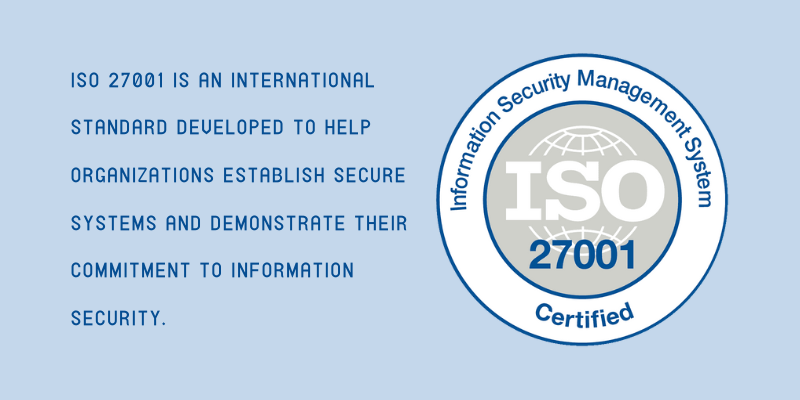
ISO 27001 is an international standard developed by the International Organization for Standardization (ISO) and the International Electrotechnical Commission (IEC) to help organizations establish secure systems and demonstrate their commitment to information security.
The standard focuses on an organization's Information Security Management System (ISMS), which includes policies and procedures that ensure the protection of sensitive data.
How ISO 27001 Works?
To obtain ISO 27001 certification, a company must undergo an audit to verify that it meets the compliance requirements and has adequately addressed potential risks to its information systems.
ISO 27001 works through a structured approach that incorporates principles, controls, and processes to manage information security risks.
The standard consists of 10 clauses and 114 controls spread across 14 categories, which outline various security measures that businesses can implement based on their specific needs and risk profile.
While full implementation of all 114 controls isn't mandatory, compliance with the 10 clauses is required to earn certification.
Who Needs ISO 27001?
ISO 27001 certification shows to your customers and prospects that security is a top priority for your business.
While it’s not legally required, many customers may require it before doing business with you, especially if you handle sensitive data. This certification is particularly common among SaaS providers, data storage, and analytics platforms.
Companies with global customers often pursue both ISO 27001 and SOC 2 certifications since many controls overlap, allowing them to undergo both audits simultaneously.
Book Your Free Expert Consultation
Importance of ISO 27001 Certification for Agencies
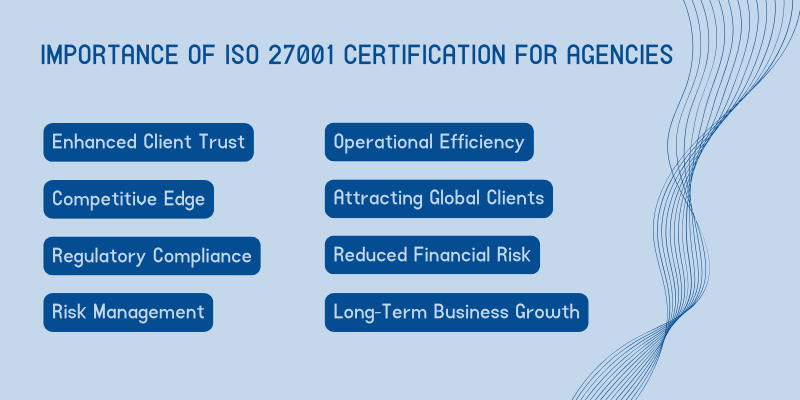
Whether you're a marketing agency handling client details, a consultancy working with sensitive business data, or a tech agency managing personal information, ISO 27001 certification demonstrates that you're not only compliant with global security standards but also proactive in safeguarding your clients' most valuable asset, their data. By securing sensitive information, you position your agency for success in high ticket affiliate marketing, which relies heavily on the trust and security clients place in your services.
Here’s why becoming ISO 27001 certified is important for agencies:
- Enhanced Client Trust: ISO 27001 assures clients that their data is being managed with the highest security standards, building confidence in your services.
- Competitive Edge: Being certified helps you differentiate from competitors, making your agency a more attractive choice for potential clients, especially when considering B2B vs B2C dynamics.
- Regulatory Compliance: ISO 27001 helps you meet industry-specific regulations like GDPR, HIPAA, and others, ensuring legal compliance.
- Risk Management: It helps you identify, assess, and address security risks, reducing the likelihood of data breaches and minimizing potential damage.
- Operational Efficiency: Implementing security best practices streamlines processes and boosts productivity, saving time and resources, helping businesses discover best SEO tools for small businesses through improved organization.
- Attracting Global Clients: As an internationally recognized standard, ISO 27001 helps you win business with clients across the globe, especially those requiring high-level data protection, even in oil and gas marketing agency contexts.
- Reduced Financial Risk: By preventing security incidents and ensuring data is protected, ISO 27001 reduces the risk of costly data breaches and associated penalties.
- Long-Term Business Growth: Certification fosters lasting relationships with clients, leading to business stability and sustainable growth in the long run.
Who Benefits from ISO 27001 Compliance?
ISO 27001 compliance offers a range of benefits for your organization, including:
- Stronger competitive position: It helps your business stand out, making it easier to attract and win new customers.
- Protection of intellectual property: Safeguard your valuable data and brand reputation.
- Customer retention: Secure data practices build trust and encourage long-term relationships with clients.
- Efficiency: Streamline your processes, saving both time and money.
- Risk mitigation: Prevent data breaches and avoid the hefty costs that come with them.
Your customers also gain from your ISO 27001 compliance:
- Data security assurance: They can be confident that their data is managed securely.
- Reduced risk: Their data, and that of their end-users, is less likely to be exposed in a breach.
- Easier vendor onboarding: The certification simplifies the process of bringing you on as a trusted partner.
- Regulatory compliance: By meeting ISO 27001 standards, you help your customers meet their own regulatory obligations, especially if your service is essential to their operations.
ISO 27001 Compliance Process: A Step-by-Step Guide
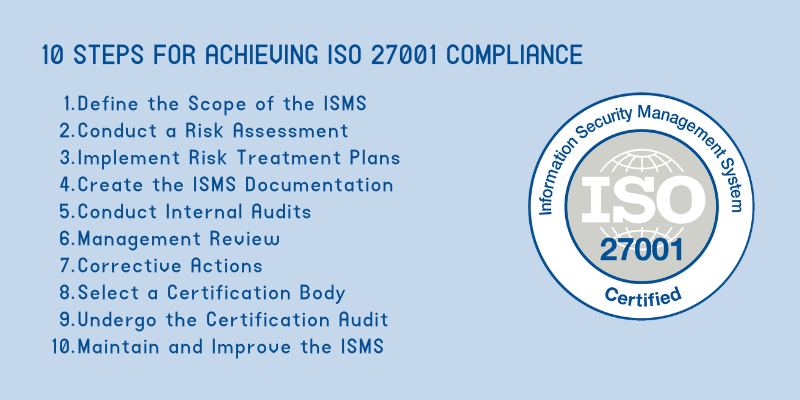
The ISO 27001 compliance process involves a step-by-step approach, including assessment, gap analysis, risk management, policy development, and certification to establish and maintain a robust information security management system. If your company specializes in enterprise SEO services, integrating ISO 27001 into your business can enhance your security protocols and build client confidence.
Here’s a step-by-step ISO 27001 compliance process:
1. Define the Scope of the ISMS
Determine the boundaries of your ISMS, considering the parts of the business, assets, and operations that need to be protected.
2. Conduct a Risk Assessment
Identify potential security risks to your information and assess the impact and likelihood of these risks. This assessment helps to prioritize security measures, particularly useful in understanding how organic SEO services can better align with secure data management.
3. Implement Risk Treatment Plans
Based on the risk assessment, define the security controls needed to mitigate or manage identified risks. These can include technical measures, policies, and employee training.
4. Create the ISMS Documentation
Document your ISMS policies, procedures, and controls. This includes the risk assessment, risk treatment plan, and a statement of applicability to show how controls are implemented.
5. Conduct Internal Audits
Regularly audit your ISMS to ensure it’s functioning as intended. Internal audits help identify areas of improvement and ensure compliance with the ISO 27001 standard.
6. Management Review
Management must review the ISMS periodically to ensure its effectiveness and alignment with the organization’s objectives. This step is vital for continuous improvement.
7. Corrective Actions
If any non-conformities or weaknesses are identified during audits or management reviews, corrective actions must be taken to address them.
8. Select a Certification Body
Choose an accredited, external certification body to perform an official audit of your ISMS. The certification body will assess whether your organization meets the ISO 27001 requirements.
9. Undergo the Certification Audit
The certification body will conduct an audit to verify your ISMS is compliant with the ISO 27001 standard. If everything is in place, you will receive the certification.
10. Maintain and Improve the ISMS
ISO 27001 certification requires ongoing efforts. Regular audits, monitoring, and improvements should be made to ensure the ISMS remains effective in the face of changing threats and business needs.
How ISO 27001 Improves Internal Processes and Efficiency?
ISO 27001 doesn’t just enhance information security, it also leads to improvements in internal processes and overall efficiency within an organization. Here's how:
1. Clear Structure and Organization
ISO 27001 requires businesses to create a well-defined Information Security Management System (ISMS) that outlines clear processes for managing data security. This structured approach leads to better organization, with defined roles, responsibilities, and processes that streamline operations and minimize confusion.
2. Risk Management Framework
The standard emphasizes identifying and assessing risks to data and implementing controls to mitigate those risks. This proactive approach helps organizations focus on critical risks and ensures that resources are allocated efficiently, rather than reacting to issues as they arise.
3. Streamlined Operations
ISO 27001 encourages continuous monitoring, internal audits, and management reviews. By regularly assessing the effectiveness of security controls and processes, organizations can identify inefficiencies and make adjustments. This process of constant improvement ensures that workflows are always optimized, reducing waste and enhancing productivity.
4. Reduced Downtime and Disruptions
By following ISO 27001’s systematic risk management approach, businesses can prevent security incidents and avoid the costly downtime and disruptions associated with data breaches. This reduces the impact on operations, allowing employees to work more efficiently.
5. Enhanced Employee Awareness
ISO 27001 requires training and awareness programs for employees to ensure they understand their roles in protecting information. Educating employees not only reduces the risk of human error but also improves overall team performance, as everyone understands the security protocols in place.
6. Compliance and Reporting
Achieving ISO 27001 certification means that your business is in compliance with international standards. This reduces the time spent on compliance checks, audits, and reporting, as the processes are already in place and regularly reviewed, leading to more efficient internal operations.
7. Improved Decision-Making
With clear security processes and a better understanding of risk, businesses can make informed decisions about their IT infrastructure, investments, and security policies. This leads to more strategic and effective decision-making, contributing to long-term business efficiency.
Given these efficiencies, the certification helps streamline operations, improve resource allocation, and create a more proactive and efficient approach to business management.
Centric Achieves ISO 27001 Certification: A Commitment to Data Security and Excellence
Centric’s achievement of ISO 27001 certification highlights our ongoing commitment to safeguarding sensitive data and enhancing our security processes.
This globally recognized standard underscores our dedication to protecting both client and organizational data through a comprehensive, risk-based approach to information security.
ISO 27001 certification demonstrates our ability to maintain high standards of data confidentiality, integrity, and availability. It ensures that both client and business data are rigorously protected from potential threats.
This milestone strengthens Centric's reputation as a trusted partner in managing and securing information, building trust with clients and stakeholders across various industries.
Achieving ISO 27001 aligns us with international best practices and reinforces our proactive approach to staying ahead of emerging security challenges in today’s digital world.
Final Thoughts
To wrap things up, ISO 27001 compliance is a game-changer for businesses when choosing an agency. It highlights the agency's commitment to protecting sensitive data with strong security practices and proper risk management.
When an agency gets ISO 27001 certified, it shows they take data security seriously. It means they’ve put in place solid internal controls, have a clear process for managing risks, and conduct regular security audits.
This not only helps them stay compliant with industry standards but also builds trust, especially in industries like finance, healthcare, and tech where data protection is crucial.
Plus, ISO 27001 is all about continuous improvement. It helps agencies stay ahead of emerging security threats and adjust to new challenges as they come.
So, for businesses wanting to protect their data and partner with reliable, secure agencies, working with one that’s ISO 27001 certified is definitely the right move.
